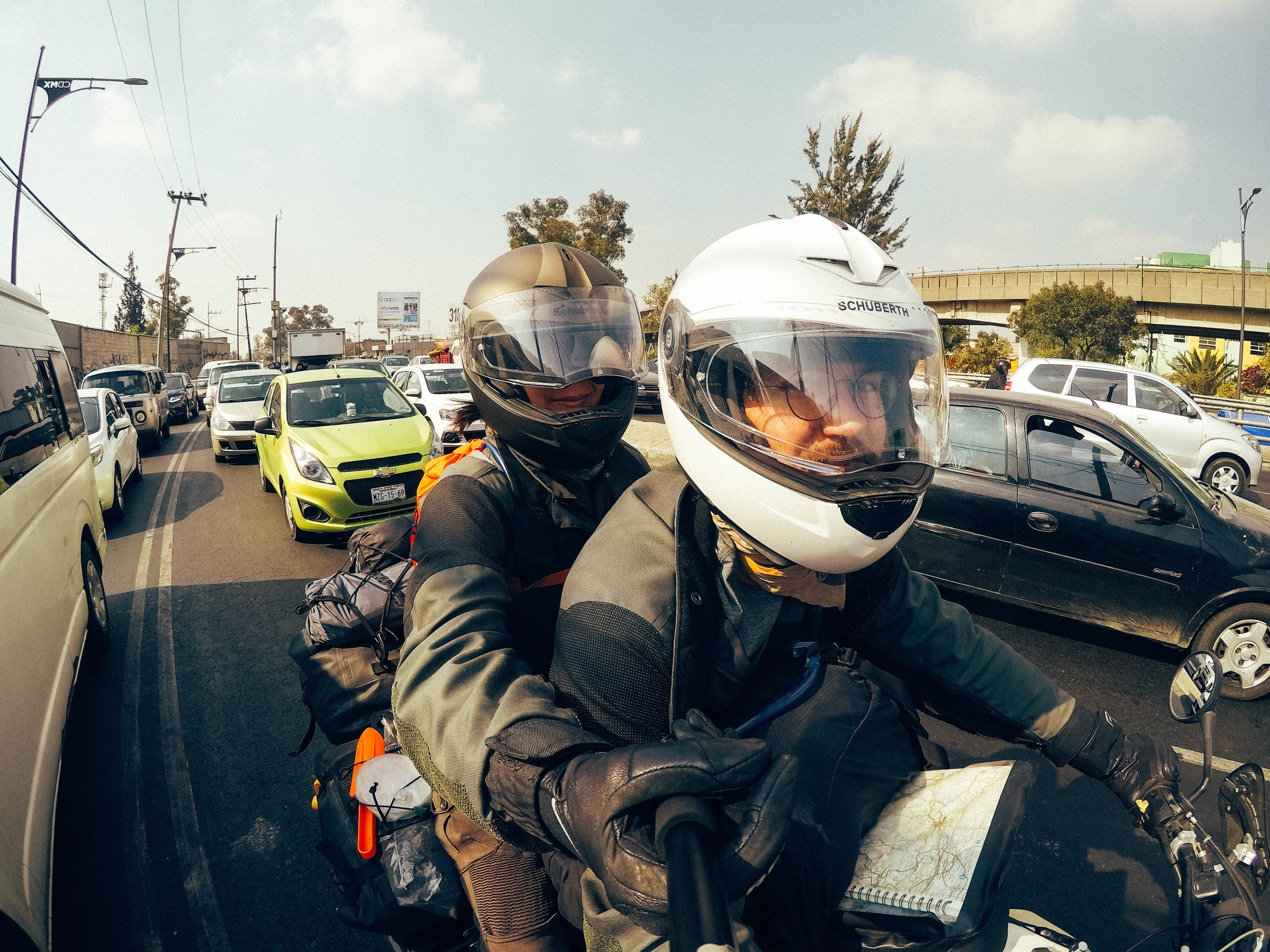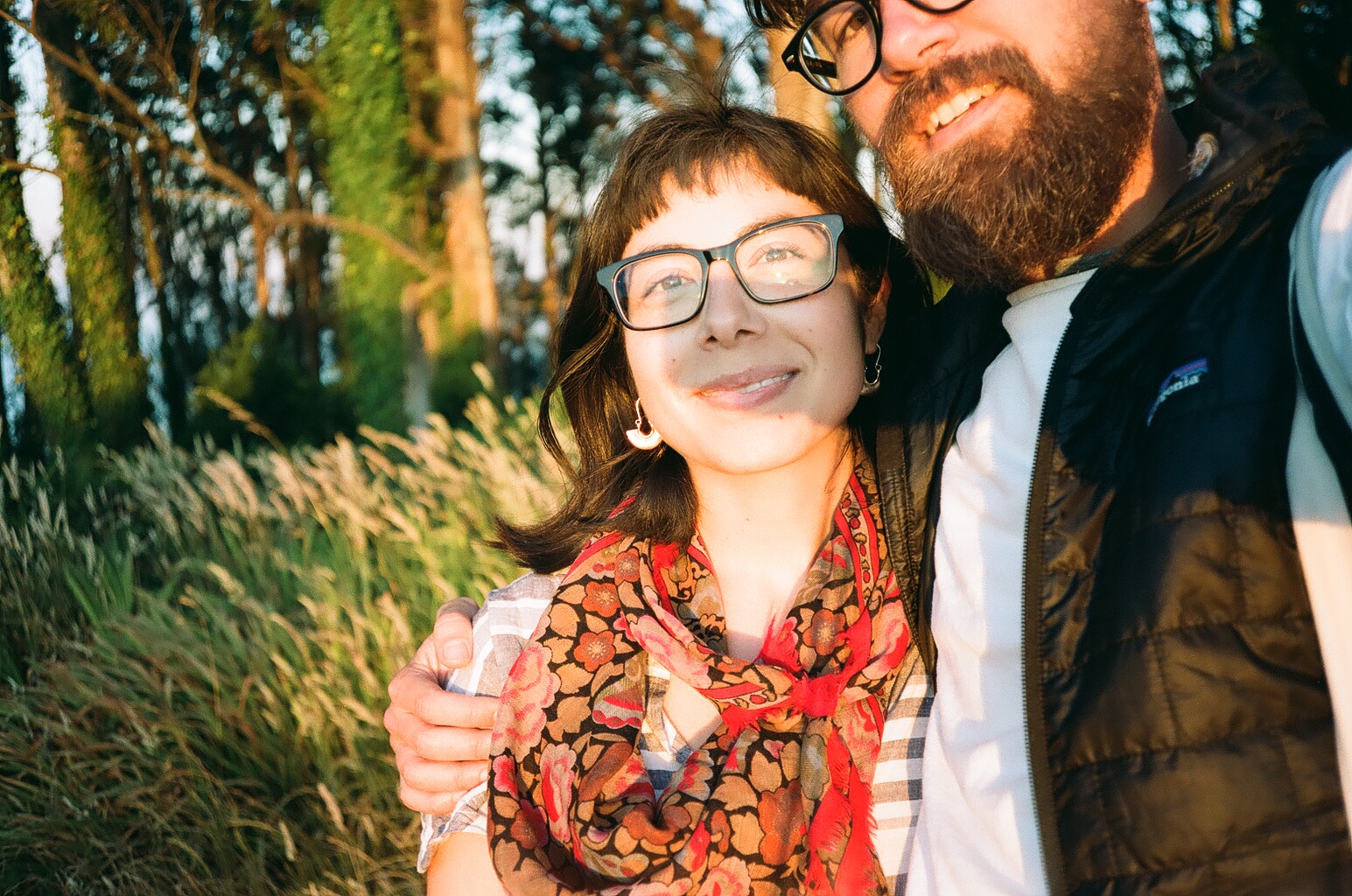“Our life together continued to be an exercise in the economy of movement. We sipped quietly from separate collapsible silicone cups, a luxury, but dipped our titanium sporks into the same cooking pot. We shared so much. Nearly everything.”
Read moreNorthward: Chile’s Tierra del Fuego
Mirador de los Condores, Parque Nacional Torres del Paine. Photo by Nathan Sharp.
We had traversed Colombia, Ecuador, Peru, Bolivia, and Argentina without seeing a single one, as I had gone without the dark, shaggy anteater; as had Nathan without the python, except in a dream. For the most part, though, we had made our peace with the shadowy places in our imaginations where it seemed they would stay, lumbering, slinking, coiling and uncoiling, just out of sight.
Read moreEl Salar de Uyuni: Or, How I Became Our Lady of Salt
Photo by Nathan Sharp
Our minds wheeled and sputtered in the blankness, on ground that was neither soil, nor sand, nor snow. The adjectives we had brought with us were not adequate here. Lunar. Martian. Salt of the moon. Salt of Mars. No, they would no longer serve us. For the salar has long glittered underfoot fantastic, yet fathomable creatures—elegantly proportioned vicuñas, fluorescent flamingoes. It has long been mined for minerals commonly used—salt and boron, and now, lithium. And so, somehow, this place was of our world also, of our home.
Read moreClose to the Sun and Always Wet: Snapshots From Bogotá, Colombia's Biggest, Baddest City
Calle 42, La Soledad, Bogotá
The constant juxtaposition of the old and the new here. Nuns in full cream and black habits glide past heavily graffiti’d walls. Hip restaurants, crowding in amongst the ubiquitous fruterias and salones de onces, offer Colombian interpretations of high-low cuisine—waffles, mac n’cheese, and artisanal burgers. At small batch coffee roasters, principled baristas proffer beans ground to order to your olfactory organ before brewing.
Read moreBecause Ted Simon Didn't Have a Period: Tales of a Wandering Womb
Truth be told, women have long been rolling up their sleeping mats and climbing on motorcycles and bicycles and sailboats and airplanes and horses and pogo sticks and adding their voices to an adventure genre that is nevertheless dominated by the voices of men. I've had the honor of sharing coffees and couches and swimming holes and mountain roads choked with dust with many of these women. I live in awe of them, and I think it's fair to observe that they, along with most women, are accustomed to the act of keeping many spinning plates in the air.
Read moreA Lesson in Persistence
Wasn’t this one mistake enough to worry about? And why had I come here if I had already decided that it was hopeless? There’s no way to talk about this without sounding cheesy. But it was true. There was no point in being there⎯⎯in putting a whole sea between myself and my companion⎯⎯if I didn’t manifest the belief, in my thoughts as well as my actions, that I would achieve my goal.
Read moreVolcano Wonderland
Volcán de Fuego, Guatemala
I wonder what it must be like to have grown up with volcanoes nearly always within sight; what force they exert on the imagination. Perhaps I can only speak for myself of the force they exert on mine—to make my daily trips to the market, to think, to be thoughtless, in the shadows of volcanoes.
Read moreExit: Mexico
Relaxing at Chipehua Beach
There are as many routes as there are people to take them. Looking back on our time in Mexico I easily become distracted by the places we did not visit.
Read moreLa Salud: Staying Healthy on the Road
I hope you’ll forgive the certified food-handler’s geek in me as I recount how swiftly and efficiently one pork-kebab stand in Coyoacan met the demands of their immense nightly crowd, and how each crew member handled raw meat, cooked food, sliced fruit, and cash payments. Without even a bottle of hand-sanitizer in sight. Did I partake of the kebabs? Sure did. Was I conflicted? You bet.
Read moreTravel Is Not the Cure
Stuck in traffic on the way out of Mexico City
What exactly are we doing out here? I’ve seen probably a dozen cathedrals now and town squares and ocean front promenades. All of them unique, many beautiful, some decrepit. We’ve weaved through hairpin turns in the mountains on the way to missions and villages, bounced over topes and washboard dirt roads, swerved around potholes and semi trucks. Crossed hundreds of bridges and tunnels. We’ve eaten many tacos from the largest al pastor spits you can imagine. We’ve seen the landscape change again and again, wet to dry to wet to dry, mountains to flatlands to mountains.
Read more“¿De Donde Vienen? ¿A Donde Van?”
Where did you come from? Where are you going?
They’re the questions we’re asked at every military checkpoint in Baja. The armed militia men behold our dusty, hulking machine and our matching, early-nineties era getup as we reply and then wave us on our way.
My purposes in traveling are fairly singular. They don't have much to do with motorcycles, or with being a bad-ass female, or with compiling “Top Ten Things To Do” lists for the Internet. When asked about what I hope to get out of this journey, I see that this trip began fulfilling its purpose the moment I left home. The moment I left that old fish boat floating in Richardson Bay, the marina gate shrieking shut behind me, I gave myself over to joy. True, I left my job for this joy; left behind the only semblance of a fulfilling career I’ve ever had, and let’s not forget—I’ll be thirty next month. Why would I leave now?
In the months preceding our departure, I considered the kinds of details I might choose to share in the accounts of my travels. I knew I would have no hesitation in recording such afternoons as those that Nathan and I spent in Mulegé. We camped on the beach at Santispak for three-and-a-half days, eating local dates and raw clams with a squeeze of lime and reading and watching small, transparent fish nip at our ankles in the clear shallows of the Sea of Cortez. Once, while day was still breaking, we sat on a stone outside our tent eating homemade chicken tamales, bought from one of the tamale-guys making his daily rounds among the beach campers, and looked out at the mirror surface of the sea. No wind or waves yet, just the ripples that fell away from the dark dorsal and back of a dolphin, which had just then decided to join us for breakfast.
Such moments feel like they have been plucked out of the cosmos for us. They are the kinds of moments our friends wished for us in their farewells and for which we carry our loved ones, living and lost, in our hearts. And all this, on this seaside morning, afforded to us by the loss of some stupid steering head cap nut which had wiggled loose from the bike at some unknown time and without which we dared not continue until we found a replacement.
It is with the same desire to write generously that I am compelled to share our hardships and frustrations. But to what degree? Perhaps I am the only one to bat an eye at this. Perhaps not. It’s a question I face as a writer as well as as a living, breathing person—a person who sometimes looks okay in photos, but who sometimes does not, and who is ultimately as susceptible to intestinal parasites as my poor, very susceptible traveling companion. It is a question we all face, in the age of social media, especially, but also in the innate and universal desire to compile a sort of autobiography, for both public and personal consumption. What lies behind the images of ourselves that we hope others will see, and why is it important that certain blemishes and bumps remain hidden? It seems to me that the jingling of all those little and loud alarm bells in our psyches are the exact occasions on which we ought to turn the beams of our compassion and gentleness on ourselves and chance revealing a bit more.
In all honesty, I worried about how the people I love would receive the news of my travel plans. I shouldered more guilt about the anxiety my departure would cause my family than they will ever know. And I had more or less resigned myself to this by the time I left; that it would be okay if they never quite “got it”. And it will be ok—however varied their griefs are, in which I play the primary agent, I know they will be proud of me for this one day.
I left because I want to get better at telling stories. I want to grow in patience for the times when my voice falters and I lose my train of thought. I want to know the freedom to speak in the terms of my choosing. I haven’t felt free because human experience is vast; because I have long struggled to find myself at the center of my own life; because my attention and feeling have always been magnetized to the person of nearest proximity; because the task of finding language authentic to a particular experience is hard.
But I know that healing awaits me in the practice of storytelling. And that the telling is one more step forward in the recovery of my voice. And that this healing is worth all the trouble.
Some people know and some people don’t know that I lived privately with Bulimia for the better part of the last decade. In fact, the very week that we crossed our first border, I brought to a close my third year of recovery. I celebrate and I continue to recover. It seems to me, as I drain the last of my delicious black coffee in a Mexican hipster cafe, that there is no better way to honor my freedom from that terrifying darkness than to shine some light into it. In the fullest possession of myself that I’ve known, I throw my fear of the cliché to the wind and call my experience of Bulimia “darkness” and I call my recovery “light”. It is pure joy knowing that the light of no one else’s creation but my own could illuminate that darkness.
This is where I’ve come from. I rightfully carry my past with me, and as we rest here in La Paz, reflection is welcome and easy. At its core, my eating disorder was the desire to escape. My body, my vessel for perception and participation, pushed into the pain and distress of the act of purging could briefly quiet whatever occupied my mind that I felt did not belong there. And the stillness that took the place of noisy, intrusive machinations over past painful experiences—even for just the fleeting, devastatingly brief moments that Bulimia allows—felt real and true. It’s what made it so hard to commit to recovery.
I work now to trust my vessel’s integrity. I work to find myself worthy enough to hold and pour out the intricate fluidity of experience. We all must. And while the difficulty of knowing how to be present is just a part of my history, it is the only history I have. And it’s important to speak of it, for it contains the lesson that to be present for pain is also to remain present for delight. It is a lesson without end.
So, when people ask me why I’m skivving off to Latin America with the man I love, I can only offer “love of self”. That’s the all and everything. And if I manage to bring something measurable to those who need measurements, fine. But I will be busy receiving the gifts—tripe tacos and sand pits and coffeehouses and mountains and delicious afternoons doing nothing—offered to me by this world that would turn without me, regardless.
How Do You Feel?
I’ve tried so hard not to leave before we’ve left. I’ve tried to stay present, to hold space, to really be with people in the way that has proved so integral to my practice. I’ve imagined how steadily, how sure-footedly I would navigate my last few weeks in Sausalito… how open-hearted and emotionally-available and excited to share my adventures. Oh, and the freedom! Ha. My imaginings proved far from reality.
Read moreBefore we begin
For posterity, this is how we look now, at mile zero (hopefully, I’ll get better at taking selfies as we progress South).
There is still a lot to get done. That has become my mantra this summer. But we are slowly checking things off the list and adding things and checking them off and adding things... Nonetheless, it is important to take some time off and reflect now and then. I've been spending so much time projecting and planning recently, that it is easy to neglect what is going on right around me. Take, for instance, this woman, who has spent three years with me now, two of which living on a little wooden boat, and who still thinks it's a good idea to take off on a 25,000 mile motorcycle trip together. So before we begin I would just like to say ‘Diana, thank you for listening to my crazy ideas, and being patient with me, and finding my lost things, and telling me when I smell bad, and pulling splinters out of my fingernails. I hope you still like me after a few thousand miles.’












